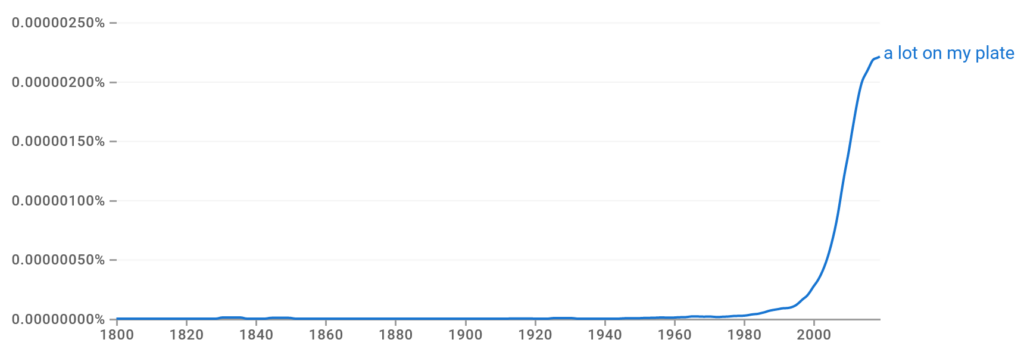A lot on my plate is an idiom that means having a significant amount of tasks, responsibilities, or challenges to deal with at the same time. My plate is full, a variation of the idiom, means the same. They both imply a sense of being busy or having a full schedule, indicating that the person may not be able to take on additional responsibilities at the moment.
Idioms, such as a lot on my plate, are words or phrases that don’t have a logical meaning outside their cultural context. They are important because they enrich the English language, reflect cultural and regional nuances, and make communication more effective.
This article discusses the idiom’s meaning, explains how to use it effectively through sentence examples, reveals its fascinating origins, and provides its synonyms. Keep reading to take a fun mini-quiz about this popular idiom and see how well you do!

What Does the Idiom a Lot on My Plate Mean?
The idiom a lot on my plate means that you have too much to do, your work schedule is too busy, or you have been given too much responsibility to deal with. Having a lot on your plate is a highly stressful position, extending beyond your usual workload or daily responsibilities.
The Cambridge Dictionary defines the idiom a lot on my plate as “to have something, usually a large amount of important work, to deal with.”
The idiom can also be expressed as having enough on my plate, meaning that you are unwilling or unable to take on any more work or responsibility. Of course, you can also use the phrase a lot on my plate in the literal sense, meaning your dinner plate is full to overflowing.
Variations
There are several variations of the idiom a lot on my plate, including the following:
- My plate is full
- I have a full platter
- I have too much on my plate
- I have a full plate
- I have enough on my plate
How Is a Lot on My Plate Commonly Used in Context?
The idiom a lot on my plate is commonly used in many different circumstances and environments. Below, we explain the idiom’s context and give a few examples and tips on using it effectively.
What Are the Different Ways to Use a Lot on My Plate?
- Work overload: “I can’t take on any more tasks right now; I already have a lot on my plate.”
- Busy schedule: “I can’t make the meeting today; I have a lot on my plate with back-to-back appointments already.”
- Personal responsibilities: “Sorry, but I can’t make your event this weekend. I have a lot on my plate with family commitments.”
- College or school commitments: “I can’t go out with you tonight; I have a lot on my plate with assignments and my forthcoming exams.”
- Financial obligations: “I wish I could afford to buy a new car, but with my bills, rent, and loans, I have too much on my plate at the moment.”
- Health issues: “I can’t renew my gym subscription this month; dealing with my health issues is already a lot on my plate.”
- Stress: “Losing my best friend has been really tough; there’s a lot on my plate emotionally right now.”
Where Can You Find Examples of a Lot on My Plate?
You can find examples of the expression a lot on my plate in various contexts, including conversations, workplace communication, personal commitments, written communication, and media and entertainment.
“I have a lot on my plate right now, but how about I help you with this portion (fill in the blank) of the project?” (Forbes Magazine)
“I told her, ‘I have a full plate, I can’t do it,’” he said. (The Chicago Tribune)
Everything happens for a reason and I feel like even though it’s been a lot on my plate, those things have inspired me to do other things. (Atlantic City Weekly)
What Are Some Tips for Using a Lot on My Plate Effectively?
Here are some tips for effectively using a lot on my plate in everyday conversation:
- Context matters: Use a lot on my plate to express that you’re too busy to take on more tasks, responsibilities, etc.
- Avoid overuse: Keep the expression for situations where your commitments are excessive rather than using the idiom too frequently and losing its impact.
- Professional tone: The phrase is often used in professional or formal contexts to describe how busy the speaker or staff member referred to is.
- Personal relationships: Be careful when using the idiom in personal relationships, as it can project a negative, unwilling attitude.
- Clarity in communication: Ensure the context makes it clear who has a lot on their plate for more effective communication.
What Is the Origin of the Idiom a Lot on My Plate?

The idiom a lot on my plate originated in 20th-century American language, transitioning from dining tables to everyday conversation. It symbolizes feeling overwhelmed with tasks or responsibilities, drawing parallels to an overflowing dinner plate.
Edith Wharton, in her work “Ethan Frome” (1911), wrote, “Sickness and trouble: that’s what Ethan’s had his plate full up with, ever since the very first helping.” This early usage exemplifies the metaphorical extension of the dining metaphor to convey life’s challenges.
More recently, in “Houseboat Killing” (1959), R. Simons used the idiom, stating, “I’ll leave you at it. I’ve got plenty on my plate at the moment.”
How Did the Idiom Evolve Over Time?
The idiom is commonly used in English today to refer to the idea of someone having too much work or responsibility than they can handle.
What Are Some Related Terms to a Lot on My Plate?
To fully understand the full meaning and use of the expression a lot on my plate, consider the following words and phrases related to the idiom.

Synonyms
- Up to my neck in it
- Up to my ears
- Snowed under
- Drowning
- Overwhelmed
Antonyms
- Free as a bird
- Empty-handed
- Carefree
- Idle with nothing to do
A Lot on My Plate: Test Your Knowledge!
Choose the correct answer.
What Have We Learned About a Lot on My Plate?
The idiom a lot on my plate and its variant my plate is full express a busy schedule and limited capacity for additional tasks. Understanding this idiom is crucial for language enrichment, reflecting cultural nuances and enhancing communication. Idioms, like a lot on my plate, offer linguistic depth, capturing shared experiences.
Explore our site for more idioms to broaden your linguistic understanding and communication skills. Delve into meanings, origins, and usage to master the nuances of expression. Happy exploring!
Check out some others we covered:
